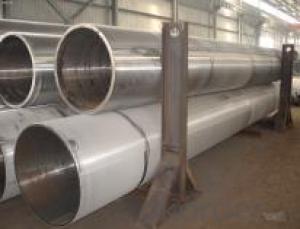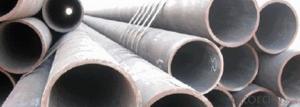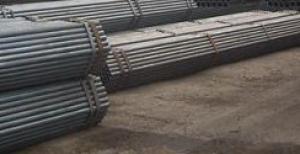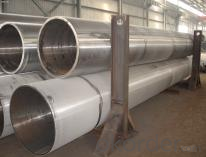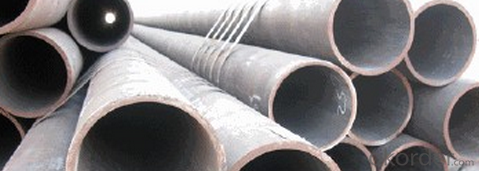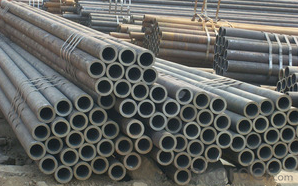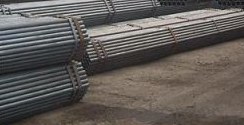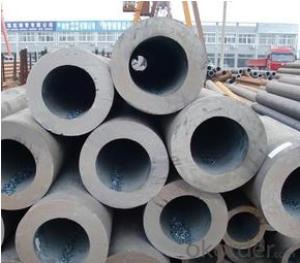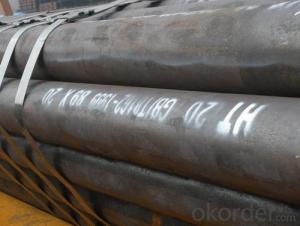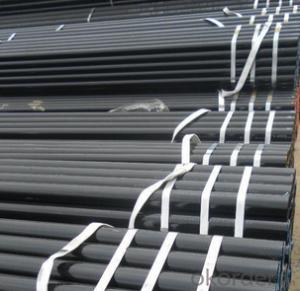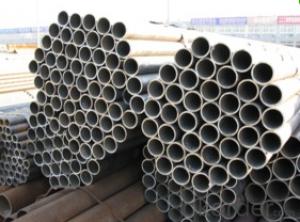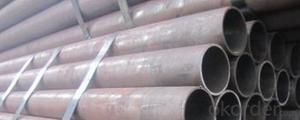Schedule 40 Seamless Carbon Steel Pipe API J55 CNBM
- Loading Port:
- Qingdao
- Payment Terms:
- TT OR LC
- Min Order Qty:
- 10 pc
- Supply Capability:
- 30 pc/month
OKorder Service Pledge
OKorder Financial Service
You Might Also Like
Quick Details
| Thickness: | 1.73 - 59.54 mm | Section Shape: | Round | Outer Diameter: | 10.3 - 914.4 mm |
| Secondary Or Not: | Non-secondary | Application: | Fluid Pipe | ||
| Technique: | Hot Rolled | Certification: | API | Surface Treatment: | Galvanized,vanish covering, black painting, galvenized ect. |
| Special Pipe: | API Pipe | Alloy Or Not: | Non-alloy | Length: | 5-12m as per customer's requirements |
| SCH: | SCH10~160, STD, XS & XXS | Payment Terms: | L/C T/T | Supply Ability: | 5000 Ton/Tons per Week |
| Product: | pipe prices | Grade: | 10#,20#,45#,A106(B,C),A53(A,B),12Cr1MoV,12Cr1MoVG,12Cr2Mo,13CrMo44,13CrMo45,15CrMo,15CrMoG,St52,St52.4,10#-45#,A53-A369,Cr-Mo alloy,ST35-ST52 | Standard: | API 5CT,API 5L,ASTM A106-2006,ASTM A53-2007,DIN 17175,GB 3087-1999,GB 5130,GB 6479-2000,GB 9948-2006,GB/T 17396-1998,GB/T 5312-1999,GB/T 8162-1999,GB/T 8163-1999,API,ASTM,DIN,GB |
Packaging & Delivery
| Packaging Detail: | By bundles, seaworthy wooden cases, steel framed cases, and simple packaging or according to the demand of the customers. |
| Delivery Detail: | within 5-15 days |
Specifications
1.pipe prices
2.Supply Ability:5000 Tons per Week
3.Payment Terms:L/C T/T
High quality Carbon steel pipe, Best pipe prices
1) Application: Overheat pipe for low and mediumpressure boiler,boiling water pipe, locomotive smoke pipe(big and small),Carry gas ,water or oil in the industries of petroleum and natural gas etc
2) Materials: 10#, 20#, 45#, 15CrMo, 12Cr1MoV, 13CrMo44, 12Cr2Mo, 13CrMo45, 12Cr1MoVG, 15CrMoG, API J55, API K55, API N80, API L80, API P110
3)Pipe according to standard: GB 3087-1999, GB/T 8163-1999, GB/T 8162-1999, GB 9948-2006, GB/T 17396-1998, GB/T 5312-1999, GB 6479-2000, GB 5130, DIN 17175, API 5CT, API 5L .
4)Packing: By bundles, seaworthy wooden cases, steel framed cases, and simple packaging or according to the demand of the customers.
Technical Parameters of Seamless Steel Pipe
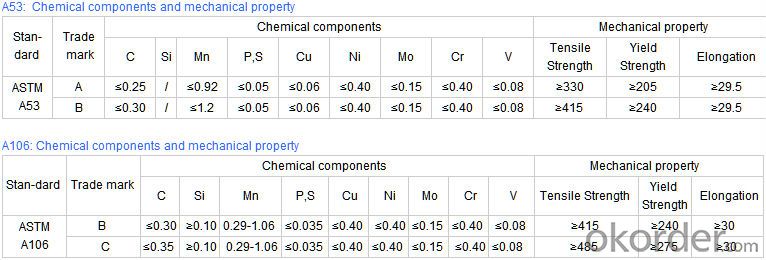
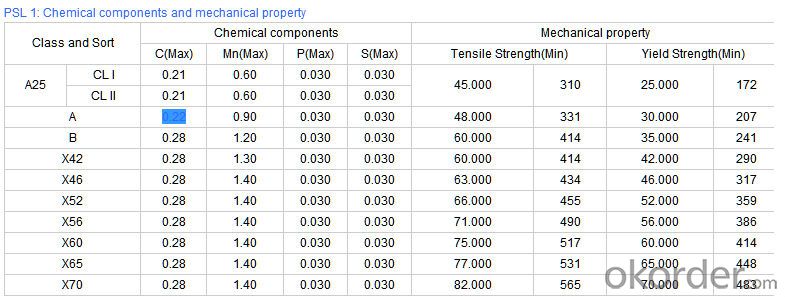
- Q: What is the difference between carbon steel and cast iron pipes?
- Carbon steel and cast iron pipes are both widely used in various industries for different applications. The main difference between these two types of pipes lies in their composition and properties. 1. Composition: Carbon steel pipes are primarily made of iron and carbon, with trace amounts of other elements such as manganese, phosphorus, and sulfur. On the other hand, cast iron pipes are made by melting iron and adding a small amount of carbon, usually between 2-4%. 2. Strength and Durability: Carbon steel pipes are generally stronger and more durable than cast iron pipes. Carbon steel has a higher tensile strength, which means it can withstand higher pressures and is less likely to be damaged or deformed. Cast iron, although strong, is more brittle and prone to cracking. 3. Corrosion Resistance: Carbon steel pipes require additional coatings or treatments to protect them from corrosion. Without proper protection, carbon steel pipes can be susceptible to rust and corrosion, especially when exposed to moisture or aggressive substances. On the other hand, cast iron pipes have inherent corrosion resistance due to the formation of a protective layer of iron oxide (rust) on their surface. 4. Weight and Installation: Cast iron pipes are typically heavier than carbon steel pipes, making them more challenging to handle and install. Carbon steel pipes are comparatively lighter, allowing for easier transportation and installation. 5. Noise and Vibration: Cast iron pipes have superior sound-deadening properties, making them quieter when fluids flow through them. On the contrary, carbon steel pipes tend to transmit more noise and vibrations. 6. Cost: Cast iron pipes are generally more expensive than carbon steel pipes due to the additional manufacturing processes and the higher cost of raw materials. In summary, the main differences between carbon steel and cast iron pipes lie in their composition, strength, corrosion resistance, weight, noise transmission, and cost. The choice between the two depends on the specific application, budget, and environmental factors.
- Q: What are the different types of steel pipe fittings?
- Some of the different types of steel pipe fittings include elbow fittings, tee fittings, cross fittings, coupling fittings, nipple fittings, and cap fittings.
- Q: How are steel pipes used in wastewater treatment plants?
- Steel pipes are commonly used in wastewater treatment plants for various purposes such as conveying wastewater, transporting chemicals, and managing water flow. They are used to transport wastewater from different treatment stages, ensuring efficient movement within the plant. Additionally, steel pipes are used to transport chemicals, such as disinfectants or coagulants, which are necessary for treating the wastewater. They also play a crucial role in managing water flow, helping to control the movement and distribution of wastewater throughout the treatment process. Overall, steel pipes are essential components in wastewater treatment plants, facilitating the movement and treatment of wastewater efficiently.
- Q: Are steel pipes suitable for transporting fluids?
- Yes, steel pipes are suitable for transporting fluids. They have high tensile strength, durability, and resistance to corrosion, making them an ideal choice for transporting various fluids, including water, oil, gas, and chemicals, over long distances. Steel pipes are commonly used in industries such as oil and gas, water treatment, and manufacturing due to their ability to withstand high pressure and temperature conditions.
- Q: What are the main types of steel pipe ah? How to judge which kind of steel pipe performance is better?
- Welded steel pipe for different welding process and divided into the furnace pipe welding (ERW) pipe and automatic arc welding, because of the different forms of welding seam welded pipe and spiral welded pipe is divided into two kinds, end its shape is divided into circular welded and shaped (square, flat) pipe.The welded pipe is rolled into the steel tubular to sew or spiral seam welded in the manufacturing method, and is divided into low pressure fluid delivery with welded steel pipe, spiral welded steel pipe, welded steel pipe, welded pipe roll etc.. Seamless steel pipe can be used in various industries, such as liquid, pneumatic, pipeline and gas pipeline. Welding pipes can be used in water pipelines, gas pipelines, heating pipes, electrical appliances, pipelines and so on.Press materialSteel pipe according to the pipe material (ie steel) can be divided into: carbon tube and alloy tube, stainless steel tube.Carbon tube can be divided into ordinary carbon steel tube and high quality carbon structure tube.The alloy tube can be divided into: low alloy pipe, alloy pipe structure, high alloy tube, high strength tube. Bearing tube, heat resistant acid resistant stainless pipe, precision alloy (such as cutting alloy) pipe, high temperature alloy tube, etc..
- Q: Can steel pipes be used for scaffolding and support structures?
- Indeed, scaffolding and support structures can make use of steel pipes. Due to their robustness, longevity, and ability to bear substantial loads, steel pipes are commonly employed in the construction industry. They establish a steady and secure framework for scaffolding and support structures, guaranteeing the safety of workers and the stability of the construction undertaking. Moreover, steel pipes possess versatility, enabling convenient assembly and disassembly, rendering them a superb option for temporary structures such as scaffolding. Furthermore, steel pipes exhibit resistance to corrosion, rendering them appropriate for outdoor applications and ensuring the enduring existence of the scaffolding and support structures.
- Q: Can steel pipes be used for offshore applications?
- Yes, steel pipes can be used for offshore applications. Steel pipes are commonly used in offshore oil and gas drilling operations, as they have high strength, durability, and resistance to corrosion, which are essential qualities for withstanding harsh marine environments. Additionally, steel pipes can be easily welded and fabricated to meet specific offshore project requirements.
- Q: Can steel pipes be used for sewage systems?
- Yes, steel pipes can be used for sewage systems. Steel pipes are commonly used in sewage systems for their durability, strength, and resistance to corrosion. They are suitable for transporting sewage and wastewater, ensuring reliable and long-lasting performance.
- Q: What are the different wall thicknesses available for steel pipes?
- There are various wall thicknesses available for steel pipes, depending on the specific requirements and applications. Steel pipes come in different schedules, which indicate the wall thickness. The most common wall thicknesses for steel pipes are Schedule 40, Schedule 80, and Schedule 160. Schedule 40 steel pipes have a relatively medium wall thickness and are commonly used for general-purpose applications, such as conveying fluids and gases. They are suitable for low-pressure systems and are widely used in plumbing, HVAC, and irrigation systems. Schedule 80 steel pipes have a thicker wall compared to Schedule 40 pipes and are designed for high-pressure applications. They are commonly used in industrial settings, oil and gas pipelines, and high-pressure fluid transport systems. The increased wall thickness provides higher strength and durability to withstand the pressure. Schedule 160 steel pipes have the thickest wall among the commonly available options. They are designed for extremely high-pressure applications, such as in refineries, chemical plants, and power generation facilities. These pipes provide exceptional strength and can handle the intense pressure and stress found in these industrial environments. Apart from these standard schedules, there are also other wall thicknesses available for specific purposes. For example, extra-strong (XS) pipes have a thicker wall than Schedule 80 pipes and are used for applications that require even higher pressure resistance. It is important to consult with professionals or refer to industry standards to determine the appropriate wall thickness for a specific application. Factors such as fluid or gas pressure, temperature, and environmental conditions should be considered when selecting the appropriate steel pipe with the desired wall thickness.
- Q: How are steel pipes protected against soil movement or settlement?
- Steel pipes can be protected against soil movement or settlement through various methods. One common method is to use protective coatings on the pipes. These coatings act as a barrier between the steel and the soil, preventing direct contact and reducing the risk of corrosion. Some commonly used coatings include epoxy, polyethylene, and zinc. Another method is to use cathodic protection. This involves the installation of sacrificial anodes along the pipeline. These anodes corrode instead of the steel pipes, protecting them from damage caused by soil movement or settlement. Furthermore, proper design and installation techniques can also help protect steel pipes against soil movement or settlement. For instance, engineers may consider factors such as soil composition, slope stability, and potential for ground movement when designing the pipeline route. Additionally, proper trenching and bedding techniques can help ensure that the pipe is adequately supported and protected against settlement. Regular inspection and maintenance are also crucial for protecting steel pipes against soil movement or settlement. Monitoring the condition of the pipeline, including the protective coatings and cathodic protection systems, can help identify any potential issues and allow for timely repairs or replacements. Overall, a combination of protective coatings, cathodic protection, proper design and installation techniques, and regular maintenance can effectively protect steel pipes against soil movement or settlement.
Send your message to us
Schedule 40 Seamless Carbon Steel Pipe API J55 CNBM
- Loading Port:
- Qingdao
- Payment Terms:
- TT OR LC
- Min Order Qty:
- 10 pc
- Supply Capability:
- 30 pc/month
OKorder Service Pledge
OKorder Financial Service
Similar products
Hot products
Hot Searches
Related keywords
